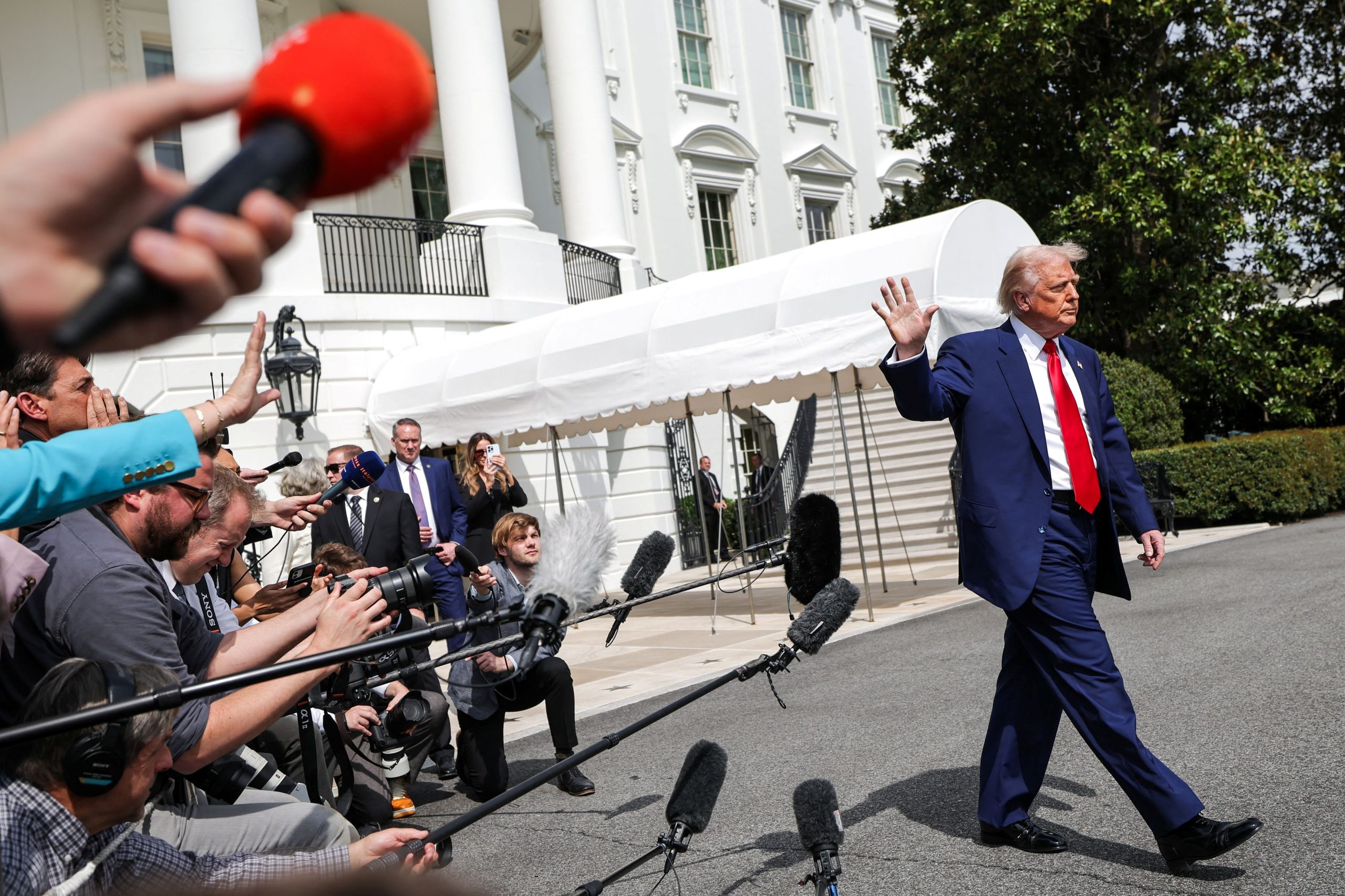WASHINGTON—And it’s only been 78 days.
No American president has disrupted so many aspects of the nation’s daily life as President Trump has in less than three months in office. His no-apologies agenda has made him the focal point of crucial decisions now being made in America’s C-suites, on factory floors, in faculty lounges, elementary-school libraries and capitals around the world—as well as around kitchen tables across the U.S.
He has moved with astonishing speed to enact an immigration crackdown, cut the federal workforce and demolish federal agencies. He is checking off a list of perceived enemies, firing people at will and slashing at major law firms that some advisers allege once aided investigations into his actions. Asserting a broad mandate, Trump has worked with little regard for public criticism. In typical is-he-serious-or-not form, Trump now flirts with seeking a third term .
“He’s going after all these targets with a sense of presidential power that is unbound,” said Princeton historian Julian Zelizer. “Where this goes next is a mystery.”
In many ways, Trump is doing what he said he would on the campaign trail, and aspects of his agenda, including deportations, have broad public appeal. But the collective impact has been dizzying for many.

People use phones as Marine One carrying U.S. President Donald Trump takes off, as he departs the White House en route to Florida, in Washington, D.C., U.S., April 3, 2025. REUTERS/Carlos Barria
Trump’s tariffs —an effort to reshape the global trading system—have put many Americans in a defensive pose as they decide how to handle the likelihood of higher prices and a rout in the market that wiped out $6.6 trillion in market value last week. Foreign governments are deciding whether to fight or negotiate new tariffs or accede. America’s allies and adversaries are reviewing their military spending as they consider a world in which Trump uses America’s military and economic muscle to squeeze every advantage from other countries at the expense of U.S. alliances.
Trump has put himself at the center of these decisions, with the power to grant waivers or cut deals with the countries, universities and firms he has put on the defensive. The open question is whether his disruption is helping him achieve his ambitions to end foreign wars, slash government and strip liberals of their power in American culture, or whether he has engendered a pushback that will undermine his plans.
“It’s been magnificent,” said Steve Bannon , the Trump ally and media megaphone, who believes the president’s destruction of the “postwar international rules-based order” that helped hollow out American jobs puts him in league with George Washington and Abraham Lincoln for a place in history.
“This is going to be the age of Trump. The whole world is affected by this guy,” Bannon said. “He’s redoing the world order. He’s not just talking about it.”
Trump has boasted of the central role he plays on the global stage, referring specifically to how nearly every U.S. trading partner has been rattled by the high tariffs they must now pay for entry into the U.S. market. “Every country’s called us,” Trump told reporters Thursday. “That’s the beauty of what we do. We’re in the driver’s seat .”
The president is getting the results he wants from many of his actions, especially as he moves to strip elite universities and law firms, as well as parts of the culture he deems as too liberal, of some of their power. Some law firms are striking deals to offer millions of dollars in free services to avoid crippling sanctions threatened by Trump, such as loss of their security clearances. Some Ivy League universities and other schools are changing their diversity policies and other practices under threat of losing hundreds of millions of dollars in funding.
In response to the tariffs Trump announced Wednesday, more than 50 countries have signaled to the White House that they want to start trade negotiations, Kevin Hassett , Trump’s economic adviser, said on Sunday.
Recent days, however, have also offered a numerical assessment of how the opposition to Trump is solidifying:
-Tens of thousands of people turned out in Washington, D.C ., on Saturday to protest Trump administration policies, in one of scores of such rallies around the country.
-More than 170 lawsuits have been filed to stop various Trump actions, producing 50 injunctions, Attorney General Pam Bondi said on Sunday.
-In Congress, the number of Republican senators backing a bipartisan bill to place limits on Trump’s tariff authority rose to seven on Friday, marking a rare rebuke to the president from within his party.
-In Wisconsin, where elections are often close, a liberal scored a 10-point victory to win a state Supreme Court seat last week, despite financial and other support for the conservative candidate from Tesla Chief Executive Elon Musk .
Republican lawmakers have started speaking more forcefully about Trump’s assertive use of presidential authority. Some believe Trump and Musk, who is leading administration efforts to slash federal agencies, have gone too far without consulting Congress. But the economic turbulence caused by Trump’s tariffs is the top concern.
“In the long run, it will work. But in the long run, we’re dead,” Sen. John Kennedy (R., La.) said of Trump’s tariff plan. “The short run matters. We’re clearly in uncharted waters. We’re in the economic unknown.”
Foreign governments in many cases are resisting Trump rather than giving in to his demands. Australia and some Asian countries, including Indonesia, have said they won’t place reciprocal tariffs on the U.S., but many bigger countries have refused to bend to Trump’s warning that they shouldn’t retaliate. China is expected to impose tit-for-tat tariffs on U.S. goods this week, and the European Union is considering retaliation. French President Emmanuel Macron has called for European companies to suspend planned investment in the U.S.

Electric cars are seen at a parking lot of an automobile factory in Xingtai, Hebei province, China April 26, 2016. REUTERS/Stringer/File Photo REUTERS ATTENTION EDITORS – THIS IMAGE WAS PROVIDED BY A THIRD PARTY. EDITORIAL USE ONLY. CHINA OUT. NO COMMERCIAL OR EDITORIAL SALES IN CHINA. GLOBAL BUSINESS WEEK AHEAD – SEARCH “GLOBAL BUSINESS AUG 29” FOR ALL IMAGES?
Moreover, Trump’s trade and national-security policies have pushed other countries to take steps that could present long-term challenges to the U.S., said Kori Schake, a National Security Council official under former President George W. Bush who now directs foreign-policy studies at the American Enterprise Institute, a right-of-center think tank.
“Now we see two of America’s closest allies in Asia—Japan and South Korea—entering into trade talks with China as a way to create a nontariff zone that could exclude the United States,” she said. At the same time, Trump has made little progress in ending Russian aggression against Ukraine, a war he promised to end “in one day.” Hamas continues to hold Israeli hostages, despite Trump’s threat that they be sent home “ or it is OVER for you. ”
“He has achieved none of those things,” Schake said, while at the same time destroying goodwill through actions such as questioning the North Atlantic Treaty Organization’s security guarantees and threatening Denmark, which fought alongside the U.S. in Afghanistan for years, with demands to take control of Greenland .
“Who is going to help us fight our wars now?” Schake asked. “If we had to defend the Taiwan Strait, what government would think the United States was trustworthy and would put their sons and daughters at risk on our behalf?”
At home, many Americans, particularly Republicans, are cheering Trump’s efforts to pare back the federal government and curtail the reach of progressive policies, such as diversity requirements in hiring. Among Americans who voted in 2024, some 83% wanted significant change in how the country is run, including 27% who said they would like to see “complete and total upheaval,” AP VoteCast, a large survey last year, found. Among Trump voters, nearly 40% wanted complete upheaval.
Now that the effects of those changes are being felt, Americans are divided. Tens of thousands of federal workers and contractors have been fired or placed on leave—scaling back medical research, national-park staffing and grants to a range of private and social service groups, and a majority of voters now say they are concerned about potential cuts to federal benefits or services, a recent Wall Street Journal poll found.
John Wilcox, who lives in rural Franklin County, Pa., pulled all of his money out of the stock market just after Trump’s inauguration because of concerns about the new president’s tariff policies. He also started saving as much of his paycheck as he could, worried that his job as a software developer for a Defense Department contractor could be cut.
He was laid off at the start of the month.
He has cut back on charitable donations and is paying closer attention to where items he buys are made, including the materials for his hobby of painting with watercolors. He noticed the paints he buys are from China and the paper he uses is from Japan, two countries subject to Trump’s tariffs. “I know those are just going to go up 30% to 40%,” said Wilcox, age 77.
Emily Heebner, a semiretired teacher in Idyllwild, Calif., isn’t sure if tariffs will raise prices. To her, Trump’s moves will be worthwhile if they bring a manufacturing revival and produce good middle-class jobs.
Decades ago, Heebner’s father ran a Buffalo, N.Y., company that made china for hotels and restaurants. It struggled against foreign competition. That experience led her to back Trump for the first time this election, after voting for Democrats in the past.
Heebner, 67, isn’t worried about how her stock portfolio is doing. “It probably needed a correction,” she said. “I think it’s not an indicator of whether this is a good strategy or not.”
While amplifying the country’s economic anxieties, Trump has also laid out a path to political success. One major domestic initiative—deporting accused gang members who are in the country illegally— is overwhelmingly popular, Journal polling has found. In Congress, Republicans are moving ahead with a tax-cutting package that could include Trump’s campaign proposals to end federal taxes on Social Security benefits, overtime and tips.
Rep. Blake Moore (R., Utah) said that Trump’s second term has been “one thing after another,” so far, and that his phone has been ringing constantly from constituents and business owners. But all the action could add up to a winning message for the president.
“As long as they see the big picture and what the strategic points may be, they can still get behind [Trump],” Moore said.
Write to Aaron Zitner at aaron.zitner@wsj.com , Alex Leary at alex.leary@wsj.com and Rachel Louise Ensign at Rachel.Ensign@wsj.com



